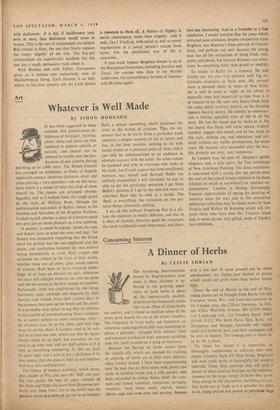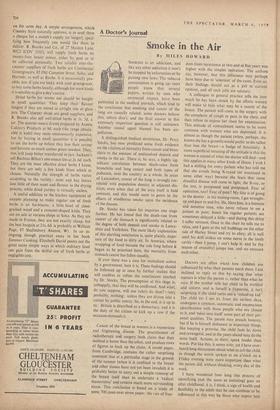Consuming_ Interest
A Dinner of Herbs
By LESLIE ADRIAN Because the flavour of herbs comes from the volatile oils, which arc released by crushing or cooking, all herbs are at their most effective when freshly picked. I have been experimenting over the past two or three years with plants and seeds in window boxes and a sink garden, and have succeeded in raising thyme (both the com- mon and lemon varieties). marjoram, tarragon, rosemary, basil (from seed), chervil, fennel, chives, sage and even mint and parsley. Anyone with a few feet of spare ground can be more adventurous; my choice was limited to plants which would not grow more than twelve inches high.
From the end of March to the end of May young plants can be brought from Roche (14 Old Compton Street, WI), and from two nurseries in the London area, the Clifton Nurseries, 5a Clif- ton Villas, Warwick Avenue, W9 (CUN 9888), and Landscape Ltd., 154 Finchley Road, NW3 (HAM 3842). The Herb Farm, Seal, Kent, and Thompson and Morgan (Ipswich) will supply seeds and plants by post, and their catalogues will be sent on request. The average cost is about Is. to Is. 6d. a plant.
To those for whom it is impossible or thoroughly troublesome to cultivate their own plants, Country Style (18 Ship Street, Brighton) will send fresh herbs at fortnightly (or weekly) intervals. From May onwards they will post a parcel of three assorted bunches (as the customer chooses) of the large variety of herbs they grow. They charge 3s. for this service, including postage. The herbs are as fresh as it is possible for them to be, being picked and posted in polythene bags on the same day. A simple arrangement, which Country Style naturally approve, is to send them a cheque for a month's supply (or longer), speci- fying how frequently you would like them to deliver. R. Brooks and Co., of 27 Maiden Lane, WC2 (COV 2101), will supply fresh herbs on twenty-four hours' notice, either by post or to be collected personally. Two reliable over-the- counter suppliers of fresh herbs are Continental Greengrocers, 85 Old Compton Street, Soho, and Harrods, as well as Roche. It is occasionally pos- sible, too, if you are lucky with your greengrocer, to buy some herbs locally, although for most kinds it is sensible to give a day's notice.
Dried herbs for winter use should be bought in small quantities: They keep their flavour longest if they are stored in airtight tins or glass jars. The Culpeper shops are good suppliers, and R. Brooks also sell well-dried herbs at 1s. 3d. a jar. The quarter-ounce drums prepared by Aroma Culinary Products at 9d. each (the range obtain- able is Wide) may seem unnecessarily expensive, but by buying in small quantities it is possible to use the herbs up before they lose their savour and become so much useless green sawdust. They, too, will keep better transferred to jars. Jackson's sell Rochias-Billon's one-ounce tins at 2s. 6d. each. They are the most effective dried herbs I know, but there are only a few kinds from which to choose. Naturally the strength of herbs varies according to the variety : mint and bay leaves lose little of their scent and flavour in the drying process, while dried parsley is virtually useless.
A useful addition to the kitchen equipment of anyone planning to make regular use of fresh herbs is an hachinette, a little bowl of close- grained wood and a crescent-shaped knife. They are on sale at various shops in Soho. As they are made in France, they are not exactly cheap, but the best bargain at 21s. 6d. is probably at William Page, 87 Shaftesbury Avenue, WI. In an in- triguing though practical essay in her book Summer Cooking, Elizabeth David points out the great many simple ways in which ordinary food can gain from the skilful use of fresh herbs at negligible cost.



































 Previous page
Previous page